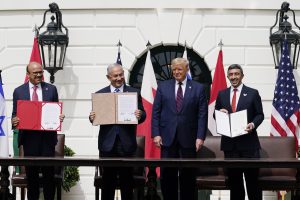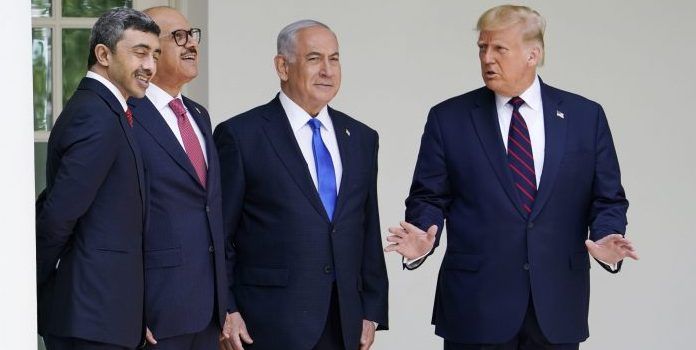(Headline USA) Declaring “the dawn of a new Middle East,” President Donald Trump on Tuesday signed historic diplomatic pacts with Israel and two Gulf Arab nations that he hopes will lead to a new order in the Mideast and cast him as a peacemaker at the height of his reelection campaign.
Hundreds of people massed on the sun-washed South Lawn to witness the signing of agreements between Israel and the United Arab Emirates and Bahrain. The bilateral agreements formalize the normalization of the Jewish state’s thawing relations with the two Arab nations in line with their common opposition to Iran and its aggression in the region.
“We’re here this afternoon to change the course of history,” Trump said from a balcony overlooking the South Lawn. “After decades of division and conflict, we mark the dawn of a new Middle East.”
The agreements do not address the decades-long Israeli-Palestinian conflict. While the UAE, Bahrain and other Arab countries support the Palestinians, the Trump administration has persuaded the two countries not to let that conflict keep them from having normal relations with Israel.
The agreements won’t end active wars, but supporters believe they could pave the way for a broader Arab-Israeli rapprochement after decades of enmity and only two previous peace deals. Liberal website Vox called the agreement with UAE “a big win for Trump.”
During the ceremony, Emirati Foreign Minister Sheikh Abdullah bin Zayed Al Nahyan, the brother of Abu Dhabi’s powerful crown prince, thanked Israel for “halting the annexation of Palestinian territories.”
“Today, we are already witnessing a change in the heart of the Middle East — a change that will send hope around the world,” al-Nahyan said.

Even the harshest critics have allowed that the agreements could usher in a major shift in the region should other Arab nations, particularly Saudi Arabia, follow suit, with implications for Iran, Syria and Lebanon. Other Arab countries believed to be close to recognizing Israel include Oman, Sudan and Morocco.
“We are very down the road with about five different countries,” Trump told reporters before the ceremony.
In addition to the bilateral agreements signed by Israel, the UAE and Bahrain, all three are signing a document dubbed the “Abraham Accords” after the patriarch of the world’s three major monotheistic religions.
“This day is a pivot of history,” Netanyahu said. “It heralds a new dawn of peace.”
“Despite the many challenges and hardships that we all face — despite all that, let us pause a moment to appreciate this remarkable day.”
The Palestinians have not embraced the U.S. vision. Palestinian activists held small demonstrations Tuesday inthe West Bank and in Gaza, where they trampled and set fire to pictures of Trump, Netanyahu and the leaders of the UAE and Bahrain.
In Israel, where the accords have received widespread acclaim, there is concern they might result in U.S. sales of sophisticated weaponry to the UAE and Bahrain, thus potentially upsetting Israel’s qualitative military edge in the region.
Trump said he is OK with selling military aircraft to the UAE. House Speaker Nancy Pelosi also welcomed the agreements but said she wants to learn details, specifically what the Trump administration has told the UAE about buying American-made F-35 aircraft and about Israel agreeing to freeze efforts to annex portions of the West Bank.
Bahrani Foreign Minister Abdullatif al-Zayani said Bahrain would stand with the Palestinians. “Today is a truly historic occasion,” he said. “A moment for hope and opportunity.”
Bahrain’s largest Shiite-dominated opposition group, Al-Wefaq, which the government ordered dissolved in 2016 amid a yearslong crackdown on dissent, said there is widespread rejection of normalization. Al-Wefaq said in a statement that it joins other Bahrainis who reject the agreement to normalize ties with the “Zionist entity,” and criticized the government for crushing the public’s ability to express opinions “to obscure the extent of discontent” at normalization.
The ceremony follows months of intricate diplomacy headed by Jared Kushner, Trump’s son-in-law and senior adviser, and the president’s envoy for international negotiations, Avi Berkowitz. On Aug. 13, the Israel-UAE deal was announced. That was followed by the first direct commercial flight between the countries, and then the Sept. 11 announcement of the Bahrain-Israel agreement.
Adapted from reporting by Associated Press.

